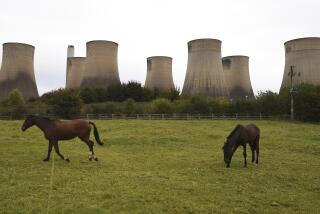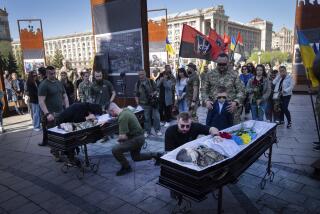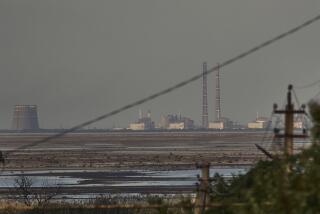Soviets to Shut Nuclear Plant at Chernobyl
MOSCOW — The Chernobyl Atomic Energy Station, the site of the world’s most serious nuclear accident, will be phased out of operation over the next five years and then permanently closed under a decision announced Friday by authorities in the Ukraine, one of the Soviet Union’s constituent republics.
The Ukrainian Supreme Soviet, the republic’s legislature, also ordered the government to “decide on the stoppage of further development of additional nuclear power stations” in the Ukraine, according to an announcement published on the front page of local Ukrainian newspapers Friday.
The two measures, announced two days before hotly contested republic-wide and local elections, appear intended to end the long and bitter controversy in the Ukraine over nuclear power that followed the explosion and fire at one of Chernobyl’s four nuclear reactors on April 26, 1986.
Although that reactor was entombed in concrete and steel and the rest of the plant was equipped with better control systems to improve its safety, Ukrainian nationalist and environmental groups have campaigned hard for the complete and immediate closure of the whole Chernobyl complex. They have made this a major issue in Sunday’s elections.
Until now, the Ukrainian government had opposed such a move, arguing that the Chernobyl complex, which is just 60 miles north of the Ukrainian capital of Kiev, has been made safe. Closing it, the authorities warned, would cause severe power shortages in the republic and violate agreements to supply neighboring countries in Eastern Europe with electrical power.
Soviet officials have lamented and even mocked the “nuclear phobia” that followed Chernobyl and called for a “rational approach” to atomic power. But Rukh, the Ukrainian nationalist movement, and Green World, an environmental protection group, have pressed Communist Party candidates hard on the issue, putting them on the defensive in Sunday’s election.
Thirty-one people were killed in the 1986 explosion and fire at Chernobyl, according to official figures, and about 200 people developed serious radiation sickness.
Soviet authorities in both the Ukraine and the neighboring Soviet republic of Byelorussia are still coping with the aftermath of the disaster. Hundreds of thousands of residents are being moved out of contaminated areas, scores of villages are being abandoned and Byelorussia has lost 20% of its farmland.
The brief announcement Friday said the Ukrainian government was ordered by the republic’s legislature to work out a program with the national Ministry of Nuclear Power Engineering that will lead to the station’s complete closure by 1995. The powers of the Ukraine’s government are being increased under the continuing political and economic decentralization of the Soviet Union.
The decision is certain to draw strong support in the Congress of People’s Deputies, the national Parliament, where members have urged the central government to shut Chernobyl and to reconsider the country’s whole nuclear power program.
The Ukrainian decision follows a similar move last year in the southern republic of Armenia to close an atomic energy plant there. Protesters said the plant was situated in a seismic area and a threat to Yerevan, the Armenian capital.
In a reassessment of its whole nuclear energy program over the last three years, the Soviet government has canceled plans to build several atomic power plants in more heavily populated areas of the country and ordered the development of “super safe” plants for use in more remote regions.
Construction of two Chernobyl-type reactors was halted last year, and the future of 12 others, including those at Chernobyl itself, was being reconsidered, nuclear safety officials said last year. In the Ukraine, plans were dropped for the construction of a nuclear plant in the Crimea, an area of considerable seismic activity.
At Chernobyl, only two of the station’s reactors are operating. In addition to the unit that has been sealed, another was shut down in January for repairs.
Parks reported from Moscow and Wallace from Lvov in the Ukraine.
More to Read
Sign up for Essential California
The most important California stories and recommendations in your inbox every morning.
You may occasionally receive promotional content from the Los Angeles Times.










